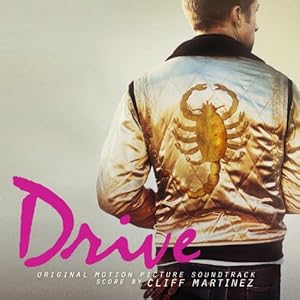But seriously, everybody loved this movie. Everybody. The critics were crazy about it because it gave them a chance to refer to movies we all should have seen except that we have jobs and families and lives apart from the movies (alas). Google reviews of Drive and in every single one you'll find some reference to Godard or Eastwood, or both, and about a dozen references to obscure films from the French New Wave, 60s Italian Cinema, and 70s American Cinema.
Here are the parts I liked: Driver's jacket, Driver's car, the cinematography (which, in my opinion holds the film together), the silences, the long driving sequences, the 80s influence, and the SHOCK of the first violence. You know, the film runs a lot like Elliott Smith's Either/Or record. Give it a listen from start to finish and tell me if I'm not right about when the second chorus of Cupid's Trick hits. That's the elevator scene.
I also like the actors and the acting. I think it was superb. They really explored the unspoken nature of their relationship (Hitchcock once said he was afraid that movies with sound would just show people talking). Drive did a good job of showing us how Driver felt in the moment; Irene,too. I think the actors made the relationship work in their subtle gestures and expressions.
But the characters were poorly drawn, and even with the incredible nuance of the actors, we still don't understand their motivations. This is a script issue. Where does Driver come from? What changes in his world to make him want to attach to someone? Why does he attach to the boy? What draws him to this hopeless situation among others? Where does the nature of Driver's interest in Irene come from? Should we go fully feminist theory and ask if he's blowing off steam because he's sexually impotent? Do we know enough to raise that question? Or more simply, how did he get so good at driving, or why? What does it mean when the garage owner says "he's the best I've ever seen"? Compared to what? And why do the thugs who want to invest in Driver as a racer happen to be the same thugs he coincidentally tangles with shortly after they meet? Did we run out of time to introduce new characters, so we stick to the ones we already know? Perhaps none of these is the right question, but they point to existence.
Godard once said that Breathless was about a man who only thinks about death and a woman who never thinks about death.
And that's the difference between Drive and the movies it wants to be. It's simple, but strangely significant.



This review is perfect. I watched the movie just so I could read the review and I can't fucking believe how much I agree with it. And, holy shit, Cupid's Trick as the elevator scene--I'm so pumped that Rob Culpepper exists.
ReplyDeleteWhile I don't necessarily disagree with all of your thoughts, I think not having a back story on Driver's motivations are what helped make the movie. He's supposed to be mysterious. I think that's what makes the violence so shocking; he comes across as calm in the first third and then, BAM, he's stomping a dude's head in.
ReplyDeleteI don't need the back story on his Dad hitting his Mom and his loss of a childhood or whatever (explanation for his closeness to the kid). He's an enigma, we can fill in the blanks. Sometimes it's better to make your own back story than have to be told WHY the characters do what they do.
I fully agree that men want to be him, though. He's cool as shit in the movie.